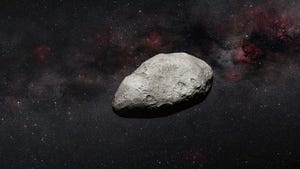
NASA's Webb Telescope Discovers New Asteroid 'Completely Unexpectedly' - CNET
The James Webb Space Telescope has been wowing us with observations of galaxies, nebulas and exoplanets, but it’s now spotted something much, much smaller: a dainty, previously unknown asteroid. The discovery came as a serendipitous surprise for astronomers.
A team of European astronomers found the asteroid in data collected by Webb’s Mid-Infrared Instrument (MIRI). “The object is likely the smallest observed to date by Webb and may be an example of an object measuring under 0.6 miles (1 kilometer) in length within the main asteroid belt, located between Mars and Jupiter,” NASA and the European Space Agency said in a statement on Monday.
The asteroid is estimated to be between 300 and 650 feet (100 and 200 meters) in length, or roughly the size of the Colosseum in Rome.
The MIRI images that revealed the asteroid were used for calibration and performance-testing purposes. Webb was actually looking at a known main belt asteroid named (10920) 1998 BC1. The new asteroid essentially photobombed the observations.
Thomas Muller, an astronomer with the Max Planck Institute for Extraterrestrial Physics, said the asteroid was found “completely unexpectedly.” The asteroid discovery is a testament to Webb’s advanced abilities. “Our detection lies in the main asteroid belt, but Webb’s incredible sensitivity made it possible to see this roughly 100-meter object at a distance of more than 100 million kilometers,” Muller said.
The research team published a study on Webb’s asteroid-spotting prowess in the journal Astronomy & Astrophysics. There’s still some uncertainty about the new space rock and follow-up studies will be needed to sort out its orbit and confirm it’s indeed a newly discovered asteroid.
The small asteroid is likely just the beginning of a bounty of space rock finds from Webb. “Repeats of these observations are in the process of being scheduled, and we are fully expecting new asteroid interlopers in those images,” said Webb support scientist Bryan Holler. The hunt is on.



